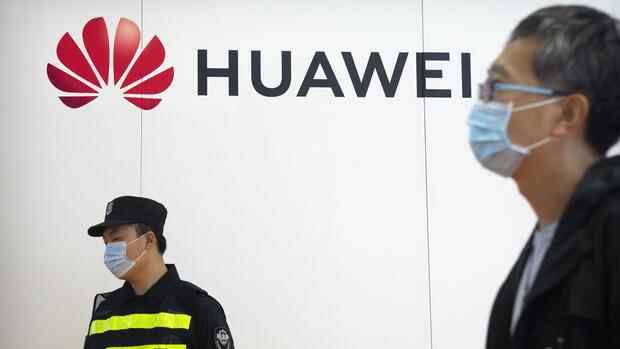Beijing Sales at the controversial Chinese IT supplier Huawei collapsed in 2021 as a result of US sanctions. The Chinese group turned over the equivalent of 99.9 billion dollars, 28.6 percent less than in the previous year. It was the first decline in sales in the company’s history.
At the same time, however, the group reported a profit increase of 76 percent. The profit includes one-time proceeds from the sale of the sanctions-hit Honor-branded smartphone division, which Reuters says could be worth more than $10 billion. The company did not comment on this figure.
However, if the order of magnitude is correct, Huawei would have suffered a profit slump of more than 20 percent minus the proceeds from the sale. As an unlisted company, Huawei only publishes a slimmed-down annual financial statement.
The comments from the Huawei leadership are correspondingly drastic. “We managed to survive into 2021,” said acting chairman Guo Ping. But “our fight for survival is not over yet”. The only way forward is through continued heavy investment in research and development.
Top jobs of the day
Find the best jobs now and
be notified by email.
The group spent more than 22 percent of sales, the equivalent of 22.4 billion dollars, in this area. According to the company, the company’s R&D spending over the past ten years has totaled 132.4 billion US dollars. The focus is on areas in which the company is not dependent on international semiconductor supply chains, such as the cloud business and artificial intelligence.
Sanctions reinforce China’s quest for technological independence
As a result of the embargo against Huawei, the Chinese government has made greater independence of its own industry from foreign technologies an important goal of its economic policy. The current sanctions against Russia are likely to further accelerate efforts towards greater technological independence.
>>Read also: Business with Russia is also becoming a risk for China’s tech companies
In May 2019, then-US President Donald Trump imposed sanctions on Huawei. Since then, the company has been largely cut off from the supply of high-tech semiconductors that contain US technology. In addition, the company is no longer allowed to use the Google operating system Android.
Huawei then sold its cheap smartphone subsidiary Honor in November 2020. In March 2021, Huawei received the first funds from the Honor transaction. As a result of the sale, the sales of the formerly largest consumer division have almost halved. In the smartphone business, the group still faces “major challenges,” said Guo
Experts believe that Huawei’s prospects are likely to deteriorate further as the company depletes its stockpile of cutting-edge semiconductors. It was able to secure this before it was placed on the US sanctions list.
In August last year, the company’s founder and CEO Ren Zhengfei announced that he would focus on software development, including strengthening the fast-growing cloud computing business. In areas where software and hardware overlap, the company should focus on optimizing the software to complement the hardware, Ren explained at the time.
Huawei hopes for the auto industry
Huawei also has high hopes for the automotive industry. According to Huawei, it has invested $1 billion in software platforms for electric cars. In July 2021, Huawei secured a patent deal with a Volkswagen supplier and will in future earn money from the networking of Volkswagen vehicles using mobile communications technology. The company also sees business potential in intelligent energy solutions.
However, in the foreseeable future, these business areas will probably not be sufficient to compensate for the drop in sales as a result of the US sanctions. Regardless of US government bans, many countries are refraining from using Huawei technology to roll out critical telecommunications infrastructure such as 5G cellular networks.
The USA and other Western countries accuse the company of installing backdoors and defeat devices in the sensitive technology. Huawei has always denied this.
The company is said to be close to the ruling Communist Party. Founder Ren Zhengfei was a civil engineer with the Chinese People’s Liberation Army before founding Huawei.
According to calculations by the “Wall Street Journal”, the group has received more than 75 billion US dollars in subsidies in the past. The group denies this number. The subsidies received are comparable to those of competing IT equipment suppliers from other countries.
The press conference at which the company presented its full-year results was chaired by CFO Meng Wanzhou, who was speaking to the media for the first time since she was released from three years of house arrest in Canada in September. The eldest daughter of company founder Ren was arrested at the instigation of the USA. She was accused of fraud and breaking sanctions against Iran. She always denied this.
More: Huawei secures patent deal with Volkswagen supplier.
